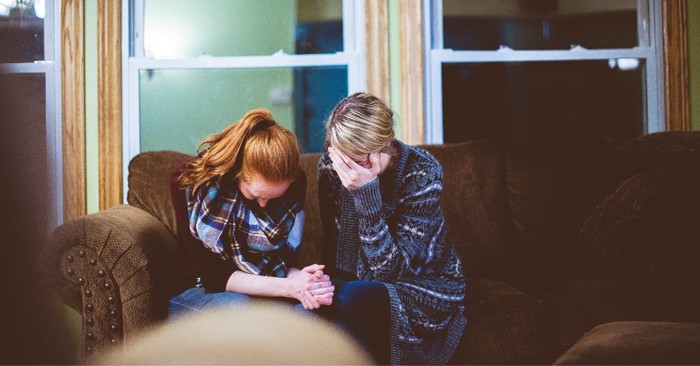
Although being vulnerable can seem daunting, we do not need to walk the road of vulnerability alone. Jesus walked the most vulnerable path. He stepped down from the heavens, becoming like a man in human flesh, with all of its vulnerabilities and weaknesses.
Being vulnerable is not easy. If we share our deepest thoughts and longings with someone, we are letting them in, not knowing how we will be received or perceived. There are times when we go through situations where we can feel helpless and powerless, like in a debilitating illness, trauma, watching the suffering of others, losing our job or home, and much more.
Yet, being vulnerable with God is coming to the One who was vulnerable for us on the cross. He created and sustains our very life. Nothing is hidden from His sight (Hebrews 4:13). Only God knows our heart (Psalm 44:21). When we open ourselves up to God, uncurling our clenched fists which so desperately want to hold on to our way of doing things, we have an opportunity to see our faith in God’s power increase.
Looking to Jesus in Our Vulnerability
Although being vulnerable can seem daunting, we do not need to walk the road of vulnerability alone. Jesus walked the most vulnerable path. He stepped down from the heavens, becoming like a man in human flesh, with all of its vulnerabilities and weaknesses. He shared His human life with His followers, and they remembered His way of life as they went on to become the early church. Jesus became vulnerable for us, therefore we can trust Him in our own vulnerability.
By making Himself like us in our humanity, He exposed Himself to physical weakness, pain and sorrow. He did not lose His power as God, but He laid down His life willingly for us. Hebrews talks of Jesus being our “great high priest” because He can sympathize with our own weaknesses (Hebrews 4:15). To become more like Jesus, is to lay down our lives, to take up our cross, to become weak. For when we are weak, then we are strong, because God’s grace is sufficient for us (2 Corinthians 12:9-11). As we follow Jesus and we are obedient to Him, our faith and trust in Him will increase.
Growing in Faith Means Letting Go of What We Think Is Ours
Growing in faith is hopefully something all followers of Jesus long for. “Increase our faith!”, we may pray, like the apostles asked of Jesus (Luke 17:5). Faith is a gift from God (Ephesians 2:8-9), but it is not the size of our faith that counts. It is in the power of God who displays what God can do with our small offerings.
Like the boy with two fish and five loaves of bread which fed 5,000 people (John 6:5-13), Jesus is the one who takes what we have and works through it by His power. All power, glory and honor belong to the Lord (Revelation 4:11).
When we are weak and vulnerable, we are more likely to rely less on ourselves and therefore look to Jesus who supplies all our needs (Philippians 4:19). Often, we may go through life thinking that we have a sense of control or security over certain things. Yet, in an instant, those things that we have depended on can be taken away. But if we have built our foundation on Jesus, the Rock of our faith, we can say along with preacher Charles Spurgeon: “I have learned to kiss the wave that throws me against the Rock of Ages.”
Suffering, persecution and hardship can do more for faith-building than our own efforts. It must be said that it can also cause us to feel like we are sinking. If our faith feels like it is floundering and we are close to drowning, maybe we cry out, like Peter sinking down in the wind and waves, “Lord, save me!” (Matthew 14:30). Jesus immediately reached out His hand and saved Peter.
It is precisely in our weaknesses that we can know He is strong and we are not. We cannot save ourselves or grow in faith without the power of the Holy Spirit at work in our life. We must not quench the Spirit (1 Thessalonians 5:19), but continue to yield, follow, trust and obey God.
Being Vulnerable with God and with Others
There is a hunger for truth and honesty in a world filled with highlight reels and fake news. Facing our fears, wrestling with our worries, and sharing our struggles can help us to move forward bit by bit. We do not need to feel so alone or cut off from others as we seek to live in relationship with God and with people.
It is possible to have hope as we allow ourselves to look to Jesus alongside others, lifting our eyes off of ourselves and our circumstances. Being vulnerable allows others to help and minister to us. It is also a way in which we can be mutually encouraged, challenged and built up in faith as we spur one another on in love and good deeds (Hebrews 10:24-25).
We may not see instant changes in our life, or in the lives of those we invest in, but change will happen by the power of the Holy Spirit who is at work. Being vulnerable means we can surrender, knowing God is at work in our weaknesses.
Jesus was met by crowds of people who all came to Him as they were, asking Him to do something for them. The woman who had been bleeding for 12 years had faith that if she just touched the hem of Jesus’ garment, she could be healed. As soon as the woman touched His garment, the bleeding stopped and Jesus knew that power had gone from Him (Luke 8:44, 46).
She would have been considered unclean in her society, so it was a risk to come to Jesus surrounded by so many people. She tried to reach Him discreetly, yet Jesus addressed her in front of the people, bringing her before them all. In fear, she fell at His feet. She was exposed before the crowds for what she had done, yet Jesus does not scold her, but addresses her as “Daughter” (Luke 8:48). He said it was her faith that made her well (Luke 8:43-48).
We can see God work in hopeless situations and circumstances if we allow ourselves to admit our weaknesses and frailties. Humbly we can come before our Savior, knowing all that it cost Him on the cross. Nothing can compare to His beaten, broken body and the blood poured out. Bleeding made the woman unclean. Yet, the one who healed this woman from her bleeding and called her “Daughter,” gave His very blood to heal us and adopt us as sons and daughters (Ephesians 1:5).
When we admit our need for a Savior from the sin that makes us unclean, believing in faith that Jesus heals us and makes us clean, we may seem vulnerable. Yet, we are saved and protected by Christ Jesus. We are covered by His blood.
Vulnerability as a Part of the Journey of Faith
Scandals inside and outside of the church, doubts brought by the difficulties we see around us, questions that arise from being challenged about our faith, plus many other factors, can leave us shaken. How can we begin to open ourselves up with the risk of getting hurt? How can we rebuild our trust in God and in others, if we have personally walked through an agonizing trial which has left us exposed? Maybe there has been hostility, ignorance, blame or any number of upsetting actions as a result of us bearing our heart. How can we rebuild what someone has torn down when we were vulnerable and laid our heart on the line?
Vulnerability is not the end of the story, just a part of the ongoing journey of faith. We come to know more of the one who redeemed us as we open up to Him consistently and honestly. There will be times of being atop a mountain, feeling victorious in the Christian life with a faith that seems to be growing, strong and powerful. Yet God is not seen just in those mountaintop experiences. Nor is He just in the valleys of our struggles. He is also in the day-to-day, flat terrain, ordinary moments.
The daily life of a believer may resemble more moments of ordinariness, where their faith is not going through a mountain range of highs and lows. Yet in the ordinary days, faith can still grow in the daily yielding and trusting of a quiet life. The life of Jesus would have included many more ordinary moments, much like cooking fish at the beach for friends, than miracles and resurrections. As John 21:25 says, “Jesus did many other things as well. If every one of them were written down, I suppose that even the whole world would not have room for the books that would be written.”
His disciples would have come to know their Teacher, and Jesus said that His sheep hear His voice, He knows them and they follow Him (John 10:27). Sheep are animals who wander, are prone to getting lost and are vulnerable to attack. Yet, the shepherd looks after the sheep and lays down his life for them (John 10:11). Jesus is the good Shepherd and we are like vulnerable sheep. But as we journey with Him daily, we get to know His voice, confident in who it is that we follow.
It takes courage to be vulnerable, but we must continue to look to the Lord Jesus. He knew His purpose and He did not go to the cross reluctantly, but willingly for us. He was obedient to the will of the Father. God does not call us to vulnerability in a “pull yourself up by your bootstraps” kind of way. He calls us to be courageous, knowing that He knows us deeply, loves us eternally, and strengthens us by His power.
That should encourage us as we watch our faith “grow in the grace and knowledge of our Lord and Savior Jesus Christ” (2 Peter 3:18).
Photo credit: Unsplash/Ben White








